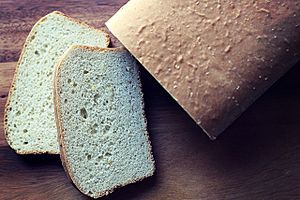Salt-rising bread facts for kids
 |
|
| Alternative names | Salt-risen bread |
|---|---|
| Type | Bread |
| Region or state | Appalachian Mountains |
| Main ingredients | Wheat flour, starter (water or milk; corn, potatoes, or wheat), bacteria (Clostridium perfringens) |
Salt-rising bread is a special kind of bread. It was very popular with early settlers in the Appalachian Mountains. Unlike most breads, it doesn't use yeast to rise. Instead, it uses tiny living things called bacteria.
This bread is made with wheat flour. It also uses a special mix called a starter. This starter can be made with water or milk, and ingredients like corn, potatoes, or wheat. A little salt and sugar are also added.
Salt-Rising Bread: A Unique Loaf
Salt-rising bread is known for being quite dense. It has a unique taste and smell. Some people say the smell of the starter is like "very ripe cheese." This bread has a tighter texture than breads made with yeast.
Why "Salt-Rising"?
The name "salt-rising" can be a bit confusing. The bread doesn't actually rise because of salt. Also, it doesn't taste salty.
One idea for the name is how the starter was kept warm. People might have placed the starter in a bed of heated salt. Another idea is that salt was used to stop yeast from growing. This would help the special bacteria grow better. These bacteria give the bread its unique flavors.
A Bit of History
No one knows exactly where salt-rising bread first came from. But it seems that pioneer women in early America discovered how to make it. This was before commercial yeast was available, which only became common around the 1860s.
Today, not many people or bakeries still make salt-rising bread. You can find it mostly in parts of the central and eastern United States. It's especially popular in places like Kentucky, West Virginia, Western New York, and Western Pennsylvania.
Is It Safe to Eat?
The main bacteria that helps this bread rise is called Clostridium perfringens. This type of bacteria can sometimes cause food problems. However, there is no record of salt-rising bread ever making anyone sick. The baking process heats the bread to very high temperatures. This heat seems to reduce the bacteria to safe levels. So, the bread is safe to enjoy!
 | Bessie Coleman |
 | Spann Watson |
 | Jill E. Brown |
 | Sherman W. White |

